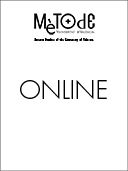The spread of Ebola: How the world health organization’s rhetoric contributed to virus transmission
DOI:
https://doi.org/10.7203/metode.6.4403Paraules clau:
Ebola, rhetoric of science, health communication, science communication, World Health Organization Resum
Resum
The tragedy of the 2014 Ebola epidemic in West Africa was exacerbated by World Health Organization (WHO) rhetoric that depicted medical personnel as saviors of an irrational and emotional public. That common rhetoric rests on a faulty image of scientific knowledge as a substance that binds its affiliates into a community with special powers and immunities. This analysis shows how such rhetoric blinded the international community to attending to the potential role of health care sites and health care workers as vectors of disease transmission. This case illustrates why analysis of rhetoric is part of a full scientific approach to gaining, sharing, and deploying knowledge.
 Descàrregues
Descàrregues
 Referències
Referències
Condit, C. M. (2014). Insufficient fear of the “super-flu”? The World Health Organization’s global decision-making for health. Poroi, 10(1). doi: 10.13008/2151-2957.1149
Dixon, M. G., & Schafer, I. J. (2014). Ebola viral disease outbreak — West Africa, 2014. Morbidity and Mortality Weekly Report, 63(25), 548-551. Retrieved from http://www.cdc.gov/mmwr/preview/mmwrhtml/mm6325a4.htm
Fasina, F. O. (2014). Transmission dynamics and control of Ebola virus disease outbreak in Nigeria, July to September 2014. Euro Surveillance, 19(40), pii=20920. Retrieved from http://www.eurosurveillance.org/ViewArticle.aspx?ArticleId=20920
Fink, S. (2014, 16 October). In layers of gear, offering healing hand to Ebola patients in Liberia. The New York Times. Retrieved from http://nyti.ms/1rh6o07
Fitzpatrick, G., Vogt, F., Moi Gbabai, O. B., Black, B., Santantonio, M., Folkesson, E., … Van Herp, M. (2014). Describing readmissions to an Ebola Case Management Centre (CMC), Sierra Leone, 2014. Euro Surveillance, 19(40), pii=20924. Retrieved from http://www.eurosurveillance.org/ViewArticle.aspx?ArticleId=20924
Forrester, J. D., Hunter, J. C., Pillai, S. K., Arwady, A., Ayscue, P., Matanock, A., … De Cock, K. M. (2014). Cluster of Ebola cases among Liberian and U.S. health care workers in an Ebola treatment unit and adjacent hospital — Liberia, 2014. Morbidity and Mortality Weekly Report, 63(41), 925–29. Retrieved from http://www.cdc.gov/mmwr/preview/mmwrhtml/mm6341a3.htm?s_cid=mm6341a3_w
Leach, M., Scoones, I., & Sterling, A. (2010). Governing epidemics in an age of complexity: Narratives, politics, and pathways to sustainability. Global Environmental Change, 20, 369–377. doi: 10.1016/j.gloenvcha.2009.11.008
Meltzer, M. I., Atkins, C. Y., Santibanez, S., Knust, B., Petersen, B. W., Ervin, E. D., ... Washington, M. L. (2014). Estimating the future number of cases in the Ebola epidemic — Liberia and Sierra Leone, 2014–2015. Morbidity and Mortality Weekly Report, 63(03), 1–14. Retrieved from http://www.cdc.gov/mmwr/preview/mmwrhtml/su6303a1.htm?s_cid=su6303a1_w
Wallis, P., & Nerlich, B. (2005). Disease metaphors in new epidemics: The UK media framing of the 2003 SARS Epidemic. Social Science & Medicine, 60(11), 2629–2639. doi: 10.1016/j.socscimed.2004.11.031
World Health Organization. (2014a). A fast-moving Ebola epidemic full of tragic surprises. Geneva, Switzerland. Retrieved from http://www.who.int/csr/disease/ebola/ebola-6-months/surprises/en
World Health Organization. (2014b). Urgently needed: Rapid, sensitive, safe and simple Ebola diagnostic tests. Geneva, Switzerland. Retrieved from http://www.who.int/mediacentre/news/ebola/18-november-2014-diagnostics/en
World Health Organization. (2014c). Travel and transport risk assessment: Interim guidance for public health authorities and the transport sector. Geneva, Switzerland. Retrieved from http://www.who.int/csr/resources/publications/ebola/travel-guidance/en
World Health Organization. (2014d). Ebola response roadmap situation report. Geneva, Switzerland. Retrieved from http://apps.who.int/iris/bitstream/10665/137424/1/roadmapsitrep_31Oct2014_eng.pdf?ua=1
World Health Organization. (2014e). WHO virtual press conference on Ebola response. Geneva, Switzerland. Retrieved from http://www.who.int/mediacentre/multimedia/vpc-29-october-2014.pdf
World Health Organization. (2014f). Ground zero in Guinea: The Ebola outbreak smoulders – undetected – for more than 3 months. Geneva, Switzerland. Retrieved from http://www.who.int/csr/disease/ebola/ebola-6-months/guinea/en
World Health Organization. (2014g). What this – the largest Ebola outbreak in history – tells the world. Geneva, Switzerland. Retrieved from http://www.who.int/csr/disease/ebola/ebola-6-months/lessons/en
World Health Organization. (2014h). Liberia: Working with communities is the key to stopping Ebola. Geneva, Switzerland. Retrieved from http://www.who.int/features/2014/liberia-stopping-ebola/en
World Health Organization. (2014i). Ebola response roadmap situation report. 5 November. Geneva, Switzerland. Retrieved from http://apps.who.int/iris/bitstream/10665/137510/1/roadmapsitrep_5Nov14_eng.pdf
Wynne, B. (2006). Public engagement as a means of restoring trust in science? Hitting the notes, but missing the music. Community Genetics, 9, 211–220. doi: 10.1159/000092659
Descàrregues
Publicades
Com citar
-
Resum1352
-
PDF 415
Número
Secció
Llicència
![]()
Tots els documents inclosos en OJS són d'accés lliure i propietat dels seus autors.
Els autors que publiquen en aquesta revista estan d'acord amb els següents termes:
- Els autors conserven els drets d'autor i garanteixen a la revista el dret a la primera publicació del treball, llicenciat baix una llicència de Reconeixement-NoComercial-SenseObraDerivada 4.0 Internacional de Creative Commons, que permet a altres compartir el treball amb un reconeixement de l'autoria del treball i citant la publicació inicial en aquesta revista.
- Es permet i s'anima els autors a difondre la versió definitiva dels seus treballs electrònicament a través de pàgines personals i institucionals (repositoris institucionals, pàgines web personals o perfils a xarxes professionals o acadèmiques) una vegada publicat el treball.





